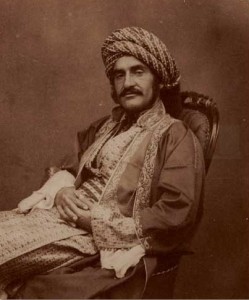Hormuzd Rassam : A Great Iraqi Archaeologist
 Prof. Fouad Y. Kazanghi
Prof. Fouad Y. Kazanghi
Hormuzd Anton Rassam was native of Iraq . He was first archeologist from the Orient who was born in Mosul (Nineve) in 1826 and died in 1910 . His father was an archdean in the Chaldean Catholic Church .When he was 20 years old , he left his school and joined an archaeological British expedition (conducted by the British Museum ) by the recomedation of his brother . His brother was deputy Consul of the British Consulate in Mosul . The expedition says then it would not pay him . Hormuzd agreed and that was during the first expedition between (1845-1847) which was led by Austen H. Layard . During this period , he asked his brother,s wife who was British to teach him English . He was clever enough to learn to speak English and to ask qustions about digging for the ancient Assyrian treasures .
The digging had been in the ancient city of Kalhu (Nimrud) which was the second capital of the Assyrian Empire between the ninth to eighth centuries B.C. B.C.Lyard found the Palace. He found also many picturial slaps in the palace . Then Lyard dug in Nineve and found the Palace of King Sancharib including the library . As Layard was ready to take the treasures to England , he suggested to Hormuzd to come with him to England to study there . Hormuzd studied in England for about one year and half in Magdalen College ( University of Oxford ) .Then Layard decided for a second expedition to Mesopotamia or Iraq and asked Hormizd to come with him . The second expedition was between 1849-1851. First Layard and the expedition dug in the ruins of Dur-Sharrukin the third cpital of Assyria which is called then (Khorsabad) . Then they dug in Nineveh and found the Palace of Senncharib and the remains of a small library which were about 2000 of Cuneiform Tablets .
Austen Lyard left the expedition and went back to England in 1851 seeking a diplomatic career. For a while the expedition was led by W.K.Loftus, but he prefered digging in another place while Rassam was still digging in the ruins of Nineveh .
In 1853 , as Rassam was digging , he discovered many carved stone slabs which were in a wing of Assurbanipal,s Palace . At the same time a cluster of earth fell to the ground with many cuneiform tablets . These tablets were part of Assurpanipal,s Library which was one of the greatest libraries of the ancient history . As he began digging again ,he found the greater part of Assurbanipal,s Library among them were the tablets of the Epic of Gilgamesh .
Subsequently, he held British political appointment in Aden and Ethiopia for a number of years , among them two years in an Ethiopian prison.
In 1876 he was asked from the British Museum to excavate again in Iraq . His final efforts during (1878-1882) which were yielding significant results as such :
1-About 24km from Mosul , he excaveted in the city of (Amgar-Bell) and found the Palace of Shalmaneser II and its two great bronze gates that are now one of the glorios pieces in the British Museum .
2-He then in the year of 1880, discovered about 170 chambers and found the library of Sippar in the temple of Shamash which rendered about 50000 tablets and inscribed cylinders . One of the two of King Nabonis Cylinders . He also excavated at Babylon, Borsippa ,Syria and round Lake Van also.(1)
Rassam subjucted to a hard test by British Musuem.
As Rassam came back from Iraq with the many glorious treasurs of great ancient civilizations , which had been taken by seniors of British Museum ,was expected to be treated by those seniors as sombody . But on the contrary , he was subjected to a hard test .
Professer Julian Reade describes in his book Rassam,s agony : “Yet H. Rassam , instead of being crowended with the honours that were his due, ended his life in disappointment and relative obsecurity. His reputation has never fully recovered from the malicious attack made upon it in his lifetime, and from the failure then to acknowledge his contribution to our knowledge of Ancient Iraq . His reputation as an archaeologist in particular has suffered …. he is condemned for not recording and publishing his excavations properly, and for being a Treasure-Hunter rather than a seaker after the truth.”(2)
(N.Y. Times Retrevied ) : how Rassam was treated by the British Museum Keeper E. A. Wallis Budge who accused Rassam that had used his relatives to smuggle antiquties out of Nineveh and had only sent (rubbish ) to the British Museum . The elderly Rassam was upset by these accusations . He had to go to the court . The court proved that Budge,s accusation had been baseless . The vetdict of the British Court had been sentenced Budge to pay one Pound only !(3)
The sustained attack on his reputation , was forced him to leave London and live the rest of his life in Brighton in obscurity and published very little of his life and his great discoveries . (4) He wrote one book to describe particulary his discoveries in the ancient cities of Kalhu and Nineveh (Assur and the land of Nimrud. 1897); It is worth mentioning Rassam preferred to publish his book in U.S.A. because the English publishers might not publish it.
During the second half of the Twetieth Century , the British Museum admitted that H. Rassam who had discovered the Library of Assurbanipal .
Sources
1-Ency. Britannica:H. Rassam
2-Reade, Julian .Mesopotamia . London: Brit.Mus. 2nd ed. 2000 . p.39
3- N.Y. Times Retrieved on 13 Sept. 2013.
